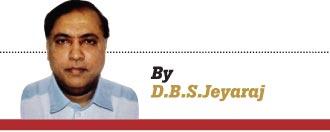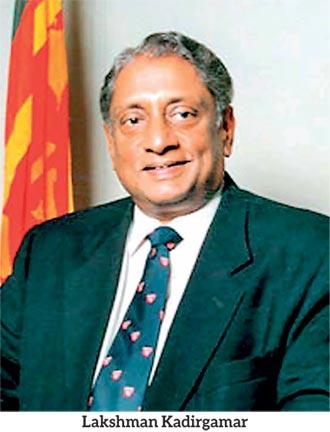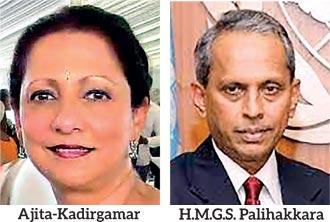Reply To:
Name - Reply Comment
 Sri Lanka’s finest Foreign Minister Lakshman Kadirgamar was assassinated in Colombo by a suspected sniper of the Liberation Tigers of Tamil Eelam (LTTE) on August 12, 2005.
Sri Lanka’s finest Foreign Minister Lakshman Kadirgamar was assassinated in Colombo by a suspected sniper of the Liberation Tigers of Tamil Eelam (LTTE) on August 12, 2005.
His death was mourned by the nation at large as a tremendous loss to the country. The void caused in Sri Lanka’s foreign affairs sphere after the demise of this great statesman was never filled properly.
I have written extensively about Lakshman Kadirgamar over the years, so much so that his only daughter Ajita has stated in her book about her father that D.B.S. Jeyaraj has written about LK possibly more than any other journalist.
Ajita Kadirgamar’s eminently readable book about Lakshman Kadirgamar is titled The Cake That Was Baked At Home.
According to Ajita, the book has 78 references to lines and passages from my articles. She even says on one page that she ‘would almost term me as ‘LK’s unofficial biographer’.
Lakshman Kadirgamar’s 18th death anniversary is being commemorated today (12 Aug 2023). It is against this backdrop therefore that I write on Lakshman Kadirgamar again drawing on some of my earlier writings also. The focus would be more from a personal angle.
Lakshman Kadirgamar was born on 12 April 1932 and was educated at Trinity College, Kandy. Kadirgamar graduated from Peradeniya University in 1953 with an LLB (Hons) degree.
He entered Law College in 1954 and passed out as an Advocate. He was admitted to the Bar in 1955. Thereafter Lakshman proceeded to the UK for studies at Oxford University where he distinguished himself as President of the Oxford Union. He returned to Sri Lanka in 1960.
Initially, Lakshman toyed with the idea of embarking on a political career. But his elder brothers in Colombo, Sam JC Kadirgamar, the lawyer, and Rajanathan (Rajan) Kadirgamar, the Naval Commander, advised him to drop his political ambition and concentrate on law.
Their father SJC (Snr) had established a lucrative practice in Colombo and was also the Founder President of the Ceylon Legal Society.
Lakshman heeded the advice of his brothers and began building up a legal practice. There are some of Lakshman’s relatives who believe that he would have never entered politics had his two elder brothers been alive. Both Rajan and Sam had passed away before Lakshman entered active politics in 1994.
Lakshman Kadirgamar returned with his family to the UK in 1971 after the 1971 JVP insurgency. He lived abroad for 17 years and returned home to Sri Lanka again in 1988.
Kadirgamar resided in Colombo and re-established his legal practice.
 Chandrika Kumaratunga Govt
Chandrika Kumaratunga Govt
The politics of Chandrika Kumaratunga in the early 1990s heralded a bright, new dawn for the country. There were high hopes that a negotiated settlement to the ethnic conflict was in sight.
It was a period of idealistic fervour. It was in such a climate that Kadirgamar decided to enter politics in support of Kumaratunga.
Initially, the person who persuaded Kadirgamar to enter politics by joining Kumaratunga was the late Dr Neelan Tiruchelvam of the TULF. He was ably supported by lawyer Manouri Muttetuwegama – wife of Sarath Muttetuwegama (CP) and daughter of Dr Colvin R. de Silva (LSSP) – in this mission.
One of Lakshman’s relatives, former Bank of Ceylon Chairman Rajan Asirwatham, also influenced him in this regard.
Lakshman was placed on the Sri Lanka Freedom Party (SLFP) led People’s Alliance (PA) National List.
No Tamil candidate from the SLFP was elected MP at the 1994 hustings. So, Kumaratunga had to appoint one Tamil from the National List as MP. This was Lakshman Kadirgamar.
The new Government had a majority of one through Up Country People’s Front (UPFA) Tamil MP Chandrasekharan’s support. He and Kadirgamar were the two Tamil representatives in the new Government initially. Kumaratunga offered them both Deputy Minister posts as she wanted to restrict her cabinet to 20. Chandrasekharan accepted but not Kadir.
Lakshman, who rarely projected himself as a Tamil, did so then. He pointed out that his community would consider it an insult if he was only to be given a Deputy Ministership. Chandrika agreed. It was a choice of Justice or Foreign Affairs. Lakshman wanted the latter. He was immensely equipped for it.
 Best Man For the Job
Best Man For the Job
Kadirgamar proved subsequently that he was the best man for the job of Foreign Minister. In the post-independence years, the Defence and External Affairs portfolios were the preserve of the Prime Minister. It was under JRJ in 1977 that a departure was made and A.C.S. Hameed became Foreign Minister.
It is broadly acknowledged that Kadirgamar was the best Foreign Minister the country ever had.
To many people, Kadirgamar was the best Foreign Minister because he spearheaded an anti-Tiger drive. But the man’s greatness was in clearing up the Augean Stables prevailing in the Ministry due mainly to the cronyism and inefficiency of previous Foreign Ministers.
It was another Tamil, Sir Kandiah Vaithiyanathan, as Permanent Secretary who set up a modern Foreign Service after independence. It was Lakshman Kadirgamar who restructured and professionalised the service. Those who worked with him from Permanent Secretary to peon would vouch for this.
Personal Interaction
I shall now write about my personal interaction with Lakshman Kadirgamar. My late father was older than Lakshman Kadirgamar but they were contemporaries at the Law College in 1954. I was born in 1954 and apparently, Lakshman Kadirgamar was at the hospital to see the new babe. He was also present in Church for my baptism. My father lost touch with him in the mid-60s but always spoke highly of his brilliance. He also said that Lakshman, though inarticulate in Tamil, was deeply concerned about issues like Sinhala being made the sole Official Language, in 1956, the 1958 violence and the suppression of the Satyagraha Campaign in 1961.
My father never accepted the Tiger accusation that Kadirgamar was oblivious to the Tamil plight. This was my experience too in later years.
I made contact with him in 1994 due to the efforts of Dr Neelan Tiruchelvam. I was then editing my own Tamil weekly in Toronto.
Kadirgamar had become a Cabinet Minister and was taking a keen interest in helping resolve the national problem.
Neelan asked me to speak to Kadirgamar as the new Minister was very keen on gaining insight into the issue and wanted to talk to me. I think we spoke about four or five times on the telephone. One call, in particular, was extremely long, extending for about 90 minutes.
I found him very much interested and concerned about the Tamil issue. He was a keen listener and extremely polite even when disagreeing with something.
I was then an ardent Tamil Nationalist, believing fervently in the bona fides of the LTTE. I was one of those Tamils who thought naively then that the LTTE was fighting for the welfare of the Tamil people and not in the interests of its leadership.
Like many Tamils of a similar mindset, I thought that the LTTE was prepared for a just, equitable and honourable settlement in a united but not necessarily unitary Sri Lanka.
Maximum Devolution
Kadirgamar was extremely receptive and agreed that Federalism would be the ideal solution. But he had reservations on two counts. One was that he felt any realistic solution had to be acceptable to the majority of the Sinhala people as otherwise, it would not be implementable.
Therefore, he opined that the concept of Federalism should be avoided and maximum devolution substituted instead.
Secondly, he said that any settlement had to be on lines acceptable to India. Therefore powers to be devolved to the periphery should not go too much beyond the Centre-State relationship parameters of India, he felt.
Kadirgamar spoke with a lot of Tamils to assess the situation. One person with whom he discussed the issue frankly and deeply was the late CSI Bishop of Jaffna Rt Rev. D. J. Ambalavanar.
I suppose that most Tamils like myself would have told him that the LTTE was keen on a settlement but had to tread the path of transition warily and slowly.
He accepted that and within the folds of Government firmly pushed that line in 1994 and early 1995.
He was thoroughly shattered in 1995 when the LTTE broke faith and resumed hostilities on the 18th of April.
My last conversation with him was a few days after this. Kadirgamar was agitated despite his customary aplomb. He was critical of me and all those who spoke positively of the LTTE. I remonstrated and when there were signs of a prolonged argument he wound up the conversation abruptly yet politely. I never spoke to him afterwards.
The War Went On
Meanwhile, the war went on. The LTTE suffered reversals during Operation Riviresa.
The local Tigers in Toronto for reasons of their own launched a campaign against my newspaper Muncharie because it was reporting battlefield news accurately and impartially.
They wanted me to publish glowing accounts of imaginary LTTE successes.
When they found violence, threats and intimidation against me were not working, they began targeting my predominantly Tamil advertisers and the Tamil shops retailing the paper.
I opted to ‘die on my feet’ by shutting the paper down rather than ‘live on my knees’ toeing the LTTE line.
Intimidation Campaign
I began writing for The Island in Sri Lanka where I had cut my journalistic teeth in English.
When some of those articles criticised the LTTE, their minions in Toronto again began a campaign of intimidation. Death threats were issued systematically. I mentioned this to some friends in Colombo who were upset by this.
They wrote an appeal on my behalf. One friend holding a high position in an international organisation added the weight of that person’s position to that appeal.
When some journalists informed Kadirgamar about my plight he responded promptly.
The Sri Lankan Foreign Minister immediately wrote to his Canadian counterpart Lloyd Axworthy and asked him to ensure my protection. This was acceded to and there was a crackdown on those behind the campaign by Canadian law enforcement agencies. The intimidation campaign ceased. I shall remember Kadirgamar’s role in this with gratitude though I had to be critical of him as a journalist despite this.
H.M.G.S. Palihakkara
Some time ago I had an exchange of e-mails with former Foreign Ministry Secretary H.M.G.S. Palihakkara regarding an article. During the course of that exchange, Palihakkara mentioned an anecdote relating to myself that concerned Foreign Minister Kadirgamar and himself.
I shall conclude this article by publishing an extract from that e-mail with Palihakkara’s permission.
This is the excerpt:
“I recall when someone suggested to the late Lakshman Kadirgamar that the Government must get journalists like DBS to write ‘balanced pieces’ to counter the Tiger propaganda, the late Minister said, ‘Implicit in your suggestion is the proposition that what Jeyaraj writes now is not balanced’ and that he is the kind of professional who will not accept that! We were at a meeting. He looked at me (I was the Foreign Secretary then) and I said that I fully agree – the best we can do is to let DBS do what he does best – write freely! This was about six months before he was brutally gunned down. I did not know you personally then but I knew and appreciated what you wrote including in The Island’.
D.B.S.Jeyaraj can be reached at [email protected]